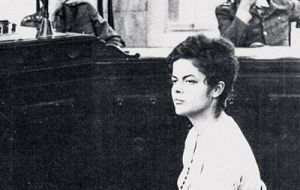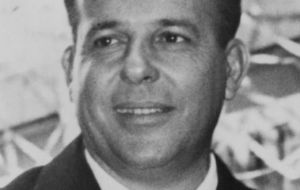MercoPress. South Atlantic News Agency
Brazil remembers the 50th anniversary of the coup that led to 21 years of military rule
 Even president Rousseff at the time a university student was arrested and tortured.
Even president Rousseff at the time a university student was arrested and tortured.  Elected president Jango Goulart was ousted by the military who feared 'communism was taking over the country'
Elected president Jango Goulart was ousted by the military who feared 'communism was taking over the country' President Dilma Rousseff remembered on Monday, 31 March, those who died or disappeared fighting for the return of democracy in Brazil on the fifitieth anniversary of the miltiary coup of 1964, which lasted until 1985 and had full political support from the United States, at the time under president Lyndon Johnson.
“Scars can be supported and overcome because today we have a social democracy and we can tell our story”, said Rousseff, herself a former guerrilla fighter who as a student was imprisoned and tortured by the dictatorship.
The leader who replicated her comments in twitter said that during 21 years “our freedom and our dreams were silenced”, but also acknowledged and valued the political engineering that led Brazil to a 're-democratization'.
In 1960 a former Sao Paulo mayor and later governor Janio Quadros was elected president of Brazil; an eccentric, populist character, who resigned only a year later among other things because of doubts about his mental health, and more specifically after having honored Cuban-Argentine guerrilla leader Che Guevara at a special ceremony with one of Brazil's most priced medals.
Quadros was succeeded by a rich cattle farmer Vice-president Jango Goulart who promised significant social and labor reforms which further consolidated a strong conservative anti-communist political public opinion force supported by the armed forces and the Catholic church.
Brazil was surprised by Quadros resignation and so was Goulart at the time in Beijing discussing diplomatic relations with Mao's China. There was strong resistance to letting Goulart take office but finally the presidential system was made parliamentary and he crossed into Brazil from Uruguay.
However three years ago extreme right groups insisted with the alleged 'communist threat' represented by Goulart and his brother in law Leonel Brizola, and was finally ousted by a military ultimatum. Goulart had support in the south of the country, but preferred to abandon the field before triggering what could have been a civil and military confrontation.
Government was again in the hands of the Brazilian military, this time the generation of officers who fought next to the US in Italy (1942/45) with ground and air forces, rabidly anti communist, impregnated with the national security theory and the Cold war spirit.
The military irruption which was to be temporary finally lasted 21 years, with the Army withdrawing on their will and conditions in 1985. The military invested heavily in infrastructure, agriculture and manufacturing but disbanded political parties, tortured and persecuted alleged opponents of the regime, freedom of the press, expression and reunion were banned and human rights abolished from official jargon.
It is estimated that in those two long decades an estimated 160.000 'suspects' were arrested, half that number abused or tortured and 400 killed or disappeared. Even Goulart who died in exile in 1976 is believed to have been poisoned by the military squads. His remains were given full presidential honors last year by the Rousseff administration and buried in Brazil, while there is a forensic investigation on to determine exactly how he died.
However Brazil remains the only country in the Southern Cone which has not taken to court those responsible for repression during the military years, and the Truth Commission created in 2012 which is looking into records of the time is advancing at a crawling pace.
But whatever the commission findings they will have a limited impact since a 1979 Amnesty bill, drafted by the military regime for their exit is still in force and protects the alleged abusers from court. Furthermore the bill was confirmed by the Supreme Court since democracy returned to Brazil and some of the military officers that played a leading role argue the 1964 'revolution' was a patriotic achievement to prevent Brazil from falling into the 'hands of communism'.
In her message President Rousseff said that the anniversary day “demands that we remember and tell what happened. We owe that to all those who died or disappeared, to the tortured and persecuted, to their families, to all Brazilians. Remembering and telling what happened is part of the very human process, of that process we started with the Brazilian people's struggle for amnesty, for a constitutional assembly, for direct elections, for growth with social inclusion, for the Truth commission, all of them manifestation and democratic processes that we have lived through in the last decades. A process that was built step by step, during each of the elected governments since the dictatorship.
”The great Hanna Arendt wrote that all human pain can be supported if the story of events can be told. The scars can be born and overcome if we can tell what happened. In this Palace (Executive Planalto), two years ago, when the National Truth Commission was nominated I said that if there are children without a country, a country without tombs, never again can there exist a story without a voice. And what will give voice to those stories are the free men and free women who have no fear of writing them. We are who give voice to history”.




Top Comments
Disclaimer & comment rules-

-

-

Read all commentsTo Pytangua in response to your comment:
Apr 04th, 2014 - 01:50 am +1Isn't it time for the US government to make a mea cupla to Latin America for its support to repressive regime...?
Yes!!! When will the U.S. start its own Truth Commission and apologize for supporting and financing Brazil's misery, not to mention its support of so many other repressive governments in South America? (The CIA trained Brazil's police in how to torture people too. There's lots more, but you have to read James N. Green to find it.) This needs to go public, and not just with a couple watered-down articles. At this point there's far more information written in Portuguese about U.S. involvement than there is in English, and you can imagine why--the same reason you give in your excellent comment.
Jack, Forget Russia. I wasn't making any parallel there. I mean the U.S. needs admit to and apologize for its support of such a terrible, abusive government (and many others. For a list, see: http://ciameddling.tripod.com/). Have you read much about the dictatorship? Like the dictators, you seem to classify anybody who opposed their vicious regime as a “guerilla.” Is it a guerilla act to attempt to unionize workers or teach the illiterate poor of the Northeast their rights? Of course not. Do you think that such heinous torture was justified for the thousands who passed through their jails, the majority of whom never committed any crime against the state? And when the State itself is an illegal institution systematically abusing citizens in violation of international law, does “crime against the State” even have the same meaning? Of course not. We're talking David and Goliath here, but you seem to have fallen prey to the myth of the “threat” represented by these largely students, church leaders, and humanitarians. You might try reading a wider variety of presses, including Brazilian and academic ones - to get a broader view.
Apr 04th, 2014 - 07:56 pm +1Geoff, what do you mean by one-sided and “proper”? I'm sure the Commission has its flaws--among them, it seems too little too late, and those who tortured and murdered still haven't been brought to justice. Is that what you mean? What would proper reconciliation look like? It seems before you can have reconciliation, you have to even admit that atrocities were committed, and that has been a challenge for decades. At least the Commission admits transgressions took place on both sides. This is very big of them, considering the enormity of the damage done by the dictatorship and the paucity of that done by the resistance, as this cartoon aptly reminds us: http://ciameddling.tripod.com/).
“...... military coup of 1964, which lasted until 1985 and had full political support from the United States, at the time under president Lyndon Johnson”.
Apr 01st, 2014 - 08:03 am 0Isn't it time for the US government to make a mea cupla to Latin America for its support to repressive regimes during the Cold War in the same way that Russian leaders have done with the countries of eastern Europe that were under the USSR? The problem is that such an act would seriously dent the global image of 'defender of freedom and liberty' - an extraordinary 'untruth' that the rulers of the US has built ever since its foundation.
Commenting for this story is now closed.
If you have a Facebook account, become a fan and comment on our Facebook Page!